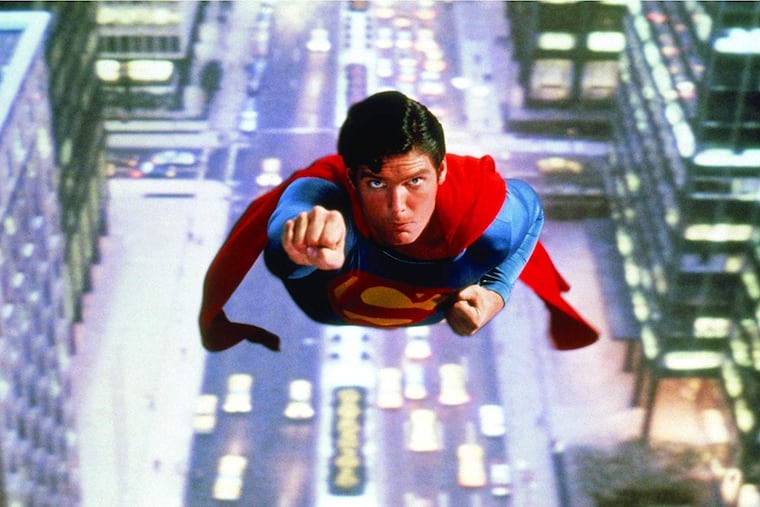A new Christopher Reeve documentary uncovers the actor’s real superpower
'Super/Man: The Christopher Reeve Story' focuses on the Princeton native's life, recovery, and activism.

Princeton, N.J.-raised actor Christopher Reeve was best known for playing Superman. But his superpower was his fight for advancements in spinal cord injury research and better quality of life for those with paralysis.
It was a cause deeply personal to Reeve, who was paralyzed from the neck down after a near-fatal horse-riding accident in 1995. At 42, he was restricted to a wheelchair and forced to breathe through a ventilator.
At the Kessler Institute for Rehabilitation in Marlton, N.J., Reeve learned to embrace the challenges his new life presented and established a foundation with his wife Dana to improve the lives of others facing the same obstacles.
He remained resolute in his mission until his death in 2004, due to heart failure.
A new documentary by filmmakers Ian Bonhôte and Peter Ettedgui, Super/Man: The Christopher Reeve Story, explores Reeve’s life as a father, husband, film star, and world changer.
Ahead of Friday’s release, The Inquirer spoke to two of Reeve’s children, Alexandra Reeve Givens and Matthew Reeve, about their father’s upbringing in South Jersey, his love of extreme sports, and the intimate moments they shared during his recovery.
This interview has been lightly edited for clarity and length.
The film didn’t really explore your dad’s upbringing much. Did you visit Princeton, N.J., as kids?
Alexandra Reeve Givens: Yes. Our grandmother lived in Princeton until a few years ago, so we grew up visiting there. Dad always felt connected there, and Dana was part of the New Jersey Shakespeare Festival for a long time. We both performed in it, and I think Dana was involved on the board. So that always felt like a deep part of our community and our history.
How was it seeing this film for the first time with all your home videos?
ARG: It was amazing to suddenly see your family’s story told in this beautiful, artistic way. Looking back on our dad and [Dana Reeve’s] life in totality was really powerful. The other thing that’s been amazing is seeing how people are connecting to the film. People are having fun revisiting the Superman adventure, and they’re connecting with it because they’ve suffered loss in their own lives. They’re seeing themselves in this story, and that’s really a beautiful thing.
Matthew Reeve: It triggered memories we might have forgotten, like a certain Halloween, Christmas, or family trip. We were lucky that we had video cameras at home, and even luckier they were used. Dana was certainly the family documentarian when we were younger, and I did a lot of filming later on.
ARG: I loved seeing the footage of him auditioning for Superman when he was still super skinny, with big sweat stains under his arms and shoe polish on his head to make him look the part. And an actress, who’s not Margot Kidder, playing opposite him as [Lois Lane].
How was it looking back at his days at the Kessler Institute for Rehabilitation?
ARG: Kessler is one of the premier rehabilitation centers in the country. We still work with them through the Christopher & Dana Reeve Foundation. We chose it because it was close to home and we had all these family ties to New Jersey.
There’s no sugarcoating it. It was an incredibly difficult time in our lives coming to grips with his new reality. It was difficult learning about the limitations and strategies needed to overcome those limitations. But what was powerful about it was that he was surrounded by people who were doing the same thing.
He started hearing from people who were going through similar circumstances, who rebuilt their lives, were back working, and were being strong for their families. And that was incredibly inspiring for him. He realized his circumstances had changed, but he was indeed the same person, and our family still needed him. It was physical rehabilitation, but it was really mental rehabilitation.
It was nice seeing that footage because dad and Dana were conscious about us feeling comfortable with his accident and feeling physically close to him even though his body worked differently. ... Our dad and the people at Kessler really encouraged that a lot, even in a hospital setting.
The Reeve family has been approached for films before. Why did you agree this time?
MR: It usually didn’t feel like the right people were approaching us. Most of them wanted to explore a narrative version of this story, which could have become a cheesy, tearjerky drama. We weren’t interested in doing that.
We’re excited to get his story to a whole generation of people who may not know who he was, or reintroduce him to people who remember him. And hopefully, they will come away with a deeper understanding of who our dad was and all the things that he could do.
What overarching message are you hoping the film conveys?
MR: I don’t know if I can pinpoint a singular thing. We wanted to show a complete 360 view of who Christopher Reeve was. And for me, I think that included some of the things that he could do before the accident, like flying a plane, playing the piano, scuba diving, and all these other things. And his determination, resilience, and spirit to do more for a wider community.
I think his larger message was that you don’t have to be Superman. The definition of a hero is an ordinary individual who perseveres despite overwhelming obstacles. And I hope people understand that revelation and the meaning of it, which is that everyone can do this.
Super/Man: The Christopher Reeve Story opens in theaters on Friday. The film will be available on Apple TV at a later date.